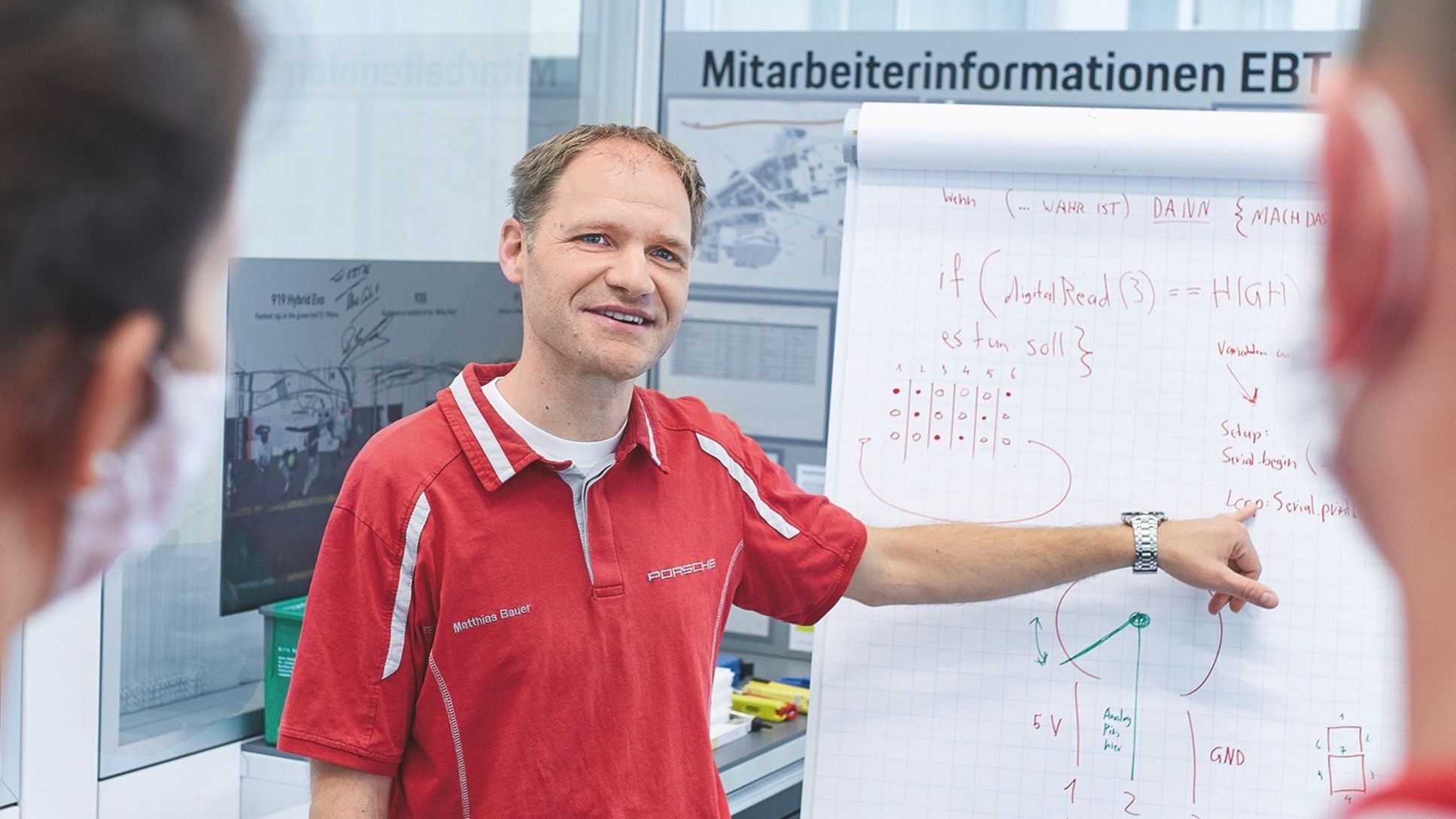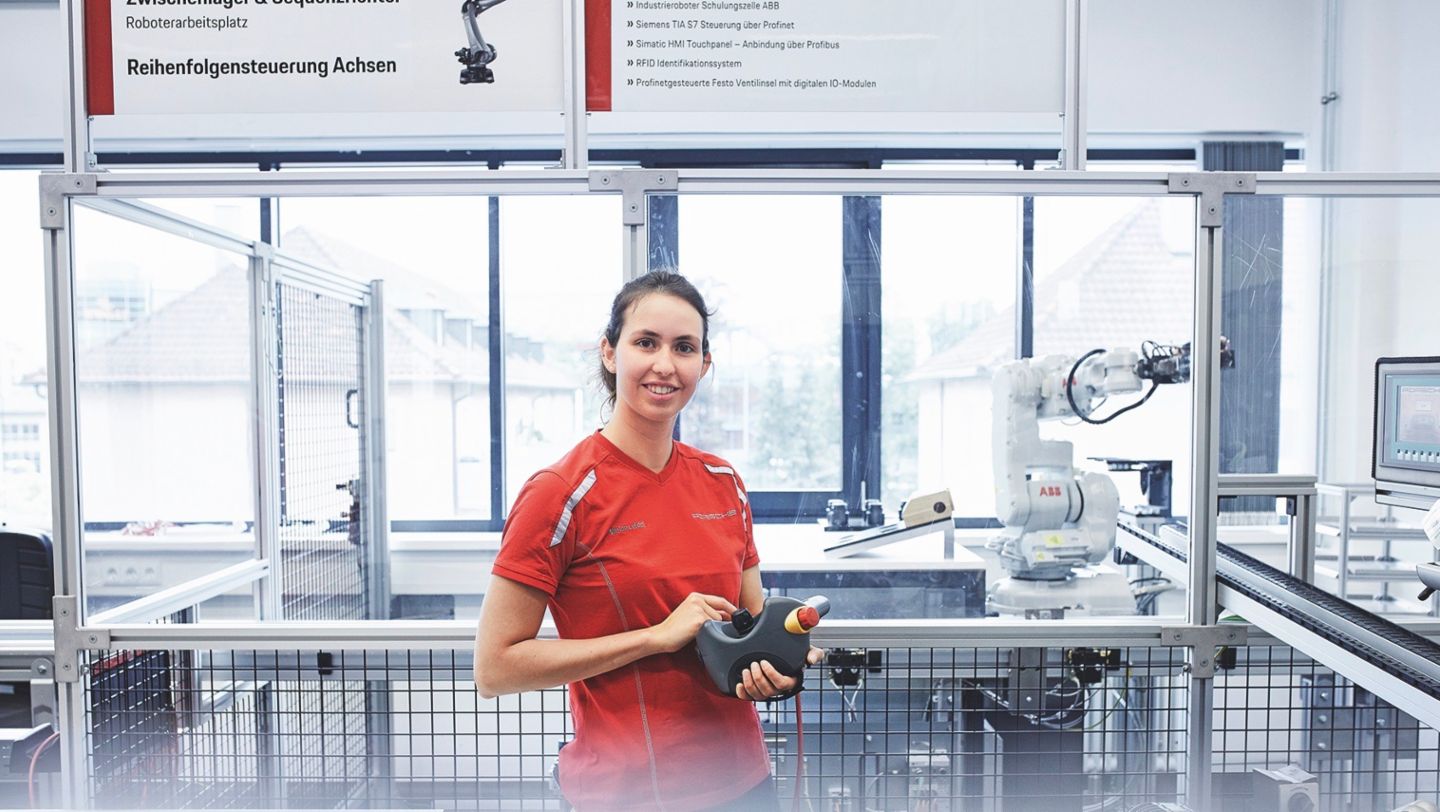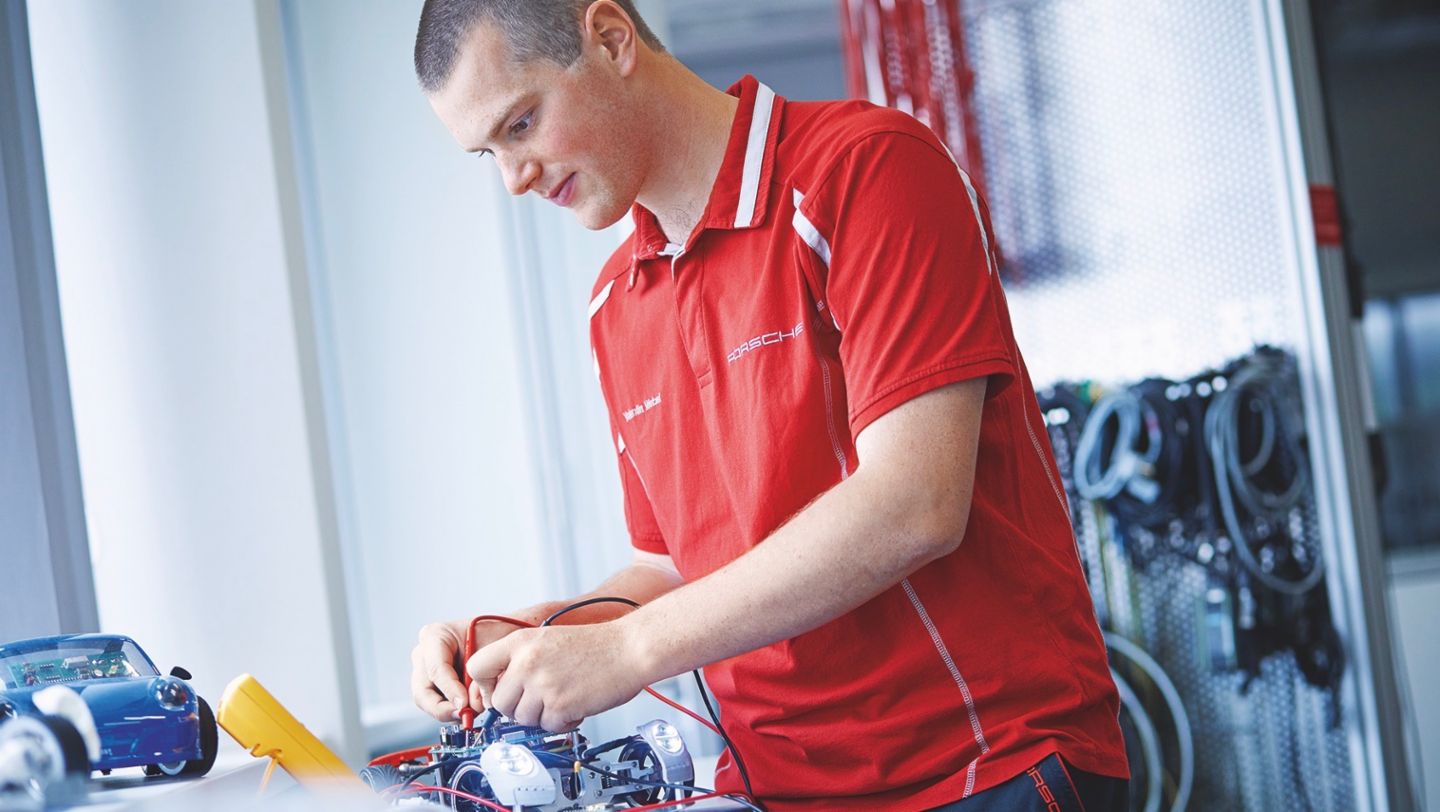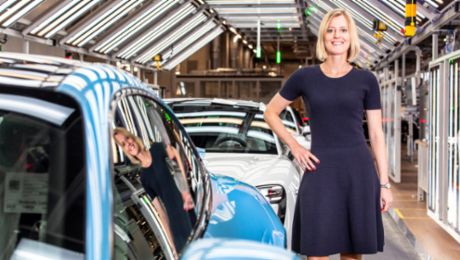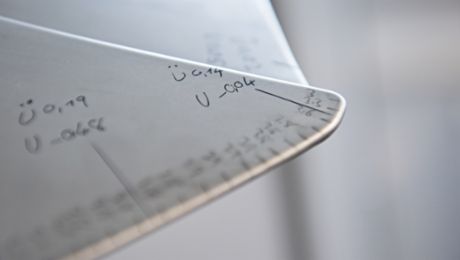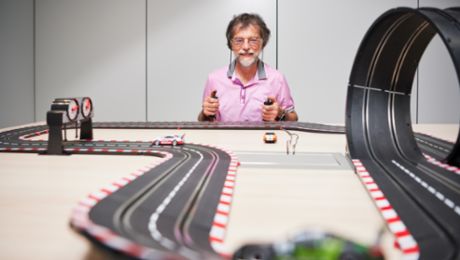Marisa Leidel and Valentin Wetzel are sitting at a large console that is covered with switch elements and immersed in a thicket of test cables. The scene is reminiscent of a high school physics class. But the small exercise book entitled Control SystemTraining Materials and sporting a silhouette of the Porsche 911 reveals that the two are in a modern car maker’s apprenticeship program to become electronics technicians for operating systems.
The scene also reflects the farsighted approach taken by the sports-car maker’s training center, one that goes well beyond tinkering with screwdrivers and soldering irons. “These types of exercises help you acquire a real understanding of the components, and develop a solution-oriented and logical mindset,” says instructor Matthias Bauer. “They lay the foundation for being able to transfer the knowledge at a later stage to different problems and new technologies.”
Vocational training at Porsche is run differently than one might expect. The first year, which combines general classes in electronics and control systems with blocks of instruction at a vocational school, is still largely based on a conventional curriculum. It is an important stage during which the apprentices acquire the practical knowledge they will need for their specialized area of work. Starting with their second year, the apprentices have a lot of leeway to shape their studies and select their focuses based on their own individual interests and strengths. “Porsche definitely gives you more flexibility than other company training programs do,” says Marisa.
It offers a perfect learning environment for people like the third-year apprentices, who have no wish to rein in their desire for knowledge. For example, after her first hands-on stint at the production department in Zuffenhausen at the start of her second year, Marisa (22) immediately decided to specialize in robotics. “I kept walking by all these robots at the plant, but didn’t have a clue about how they work,” she recalls. So she began gathering material about the field and set about learning.
“Training only works well these days if the apprentices are involved in everyday operations.” Matthias Bauer, Industrial electronics instructor
There are good reasons for the fact that Porsche’s apprentices have so many opportunities to learn and explore. The job descriptions for electronics technicians have become extremely varied, not only in the plant engineering sector. To build and maintain the precision machinery at Porsche factories, the employees need to be skilled in electronics, robotics, automated systems, and computer science—at the very least. According to Matthias, it’s impossible to expect instructors to convey all the requisite information on a step-by-step basis to apprentices in a traditional setting. “Training only works well these days if the apprentices are involved in everyday operations,” he says.
That also means they might do some educational work themselves. “Sometimes people from the first year will come to those of us in the second year and ask us to help them understand something,” says Valentin (22). The instructors welcome this, because both sides will learn from their exchange—not only the subject matter but also interpersonal skills. One apprentice will acquire new knowledge and also learn how to find the right individual who can help, and the other will deepen and reinforce existing knowledge, and gain self-confidence in the process.
Marisa and Valentin have now reached that stage of the program in which they can also expand their abilities by actually applying them. They do this in the course of project work, which they pursue in addition to specialized company seminars, vocational school instruction, and hands-on stints at different company departments. For example, the apprentices are currently working on a team with industrial mechanics and work/study computer science students to construct a robot cell that is later expected to offer complete seminars for educational and further training programs.
They are not only responsible for setting up the electronics, but have also helped design the underlying educational approach. There is no limit to the number or variety of these projects. Marisa and her colleagues, for example, have already designed and conducted a practice-based electronics seminar for work/study students. And Valentin was part of the group that created disinfectant dispensers specifically designed for all the Porsche sites.
Matthias prefers to supervise the project work from the background and let the apprentices develop their own ideas. He only occasionally steps in to adjust course, and learns things himself in the process. “These types of projects always have people who find new ways of doing things that I myself wasn’t aware of,” he observes. Marisa and Valentin each promptly recall a similar experience. The training center was the site of lively debate about a possibly superfluous circuit board in a model car, and about an additional battery switch in the disinfectant dispenser. In both cases, the apprentices’ arguments ultimately prevailed.
Matthias also recognizes that there are some areas in which the apprentices are further along than he is. The world is changing, and young people like Marisa and Valentin have grown up with smartphones and are at home in a digital environment. Their head start in these areas shows up on occasion when these topics are on the agenda in the apprenticeship program. “As an instructor you have to be able to handle that,” says Matthias. Those types of situations make him all the more aware that he, too, will never stop learning and that there will always be new areas to explore.
“You’ll always need input from the instructors. Our knowledge takes root by exchanging ideas with them.” Valentin Wetzel, Apprentice
This innovative approach to learning is also changing the relationship between the instructors and the apprentices. This is because an instructor also plays a crucial role when the young people bring a great deal of knowledge to the table and the learning experience is mutual. “You’ll always need input from the instructors. Our knowledge only takes root by exchanging ideas with them,” says Valentin.
Matthias and the other instructors serve as sparring partners for the apprentices. They are ready to handle problems and answer questions. They supervise projects, encourage learning in targeted ways, and assign the tasks that need to be done. Assignments are not always based on purely practical considerations. Sometimes a more introverted apprentice is given a project that might require overcoming an inner hurdle or two. If he or she succeeds in doing so, that can also mean developing a stronger character. Teaching has always included an element of encouragement.
Our apprenticeships (m/f/x)
Porsche trains young people for eight technical and two commercial occupations in future-oriented fields.
Technical apprenticeships
- Mechatronics specialist for passenger vehicle systems
- Mechatronics specialist for systems and high-voltage engineering
- Industrial mechanic for automotive manufacture
- Vehicle body and construction mechanic
- Automotive interior installer
- Automotive painter
- Electronics technician for operating systems
- Warehouse logistics operator
Commercial apprenticeships
- Industrial clerk
- Industrial clerk with additional qualification as assistant for international business management with foreign languages
Info
Text first published in the magazine Campus.
Text: Benjamin Büchner
Photos: David Breun
